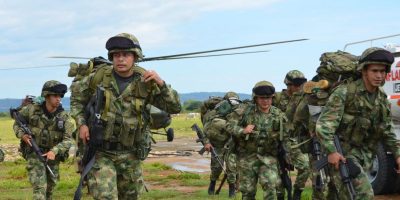US Plans to Invade Venezuela Through Colombia

Colombia is under a pro-Washington government. The country’s current president, Iván Duque Márquez, has been noted for a series of policies of alignment with the United States, continuing the legacy of his predecessor, former president Juan Manuel Santos, who has made Colombia a NATO’s “global partner”, allowing the country to participate in joint military operations of the Western military alliance. In general, the long scenario of crises and tensions in Colombia, marked by drug trafficking and the conflict between criminal factions and rebel parties, has driven its governments towards a policy of alignment with Washington in exchange for security, which has increased in recent years.
However, not all Colombian politicians approve these measures. Recently, the leftist senator Iván Cepeda asked Colombian Congressional President Lidio García to convene a session to investigate and legally control the government in its collaboration with the constant arrival of American soldiers in the country. According to Cepeda, the presence of these military personnel is hostile to Colombia, deeply affecting the maintenance of national sovereignty.
Cepeda claims that the government should consult the National Congress before allowing the American military to arrive. A recent decision by the Supreme Court of Cundinamarca proved Cepeda right. According to the judges of the Court, the unilateral decision to allow the entry of foreign troops violates the Colombian National Constitution, and the Executive Branch must previously submit the matter to the Congress. For this reason, the Court asked the government to send information about the joint operations in progress, with the aim of clarifying the reason for the arrival of American troops. The deadline for sending the report was July 6 and was not met by the government – which claims it will appeal the decision. Due to the non-compliance, Cepeda filed a request for the establishment of a special congressional session.
The exact number of US military personnel in the country is uncertain, which further raises suspicions about the case. Some sources say there are more than 800 Americans, while others say they are between 50 and 60 military personnel. No official note was given by the government to explain the reasons and the exact number of soldiers. On the other hand, the American Embassy in Colombia, under pressure, commented on the case, giving an unsatisfactory answer. According to American diplomats, military personnel are arriving in Colombia to carry out joint operations to combat drug trafficking. Apparently, these operations would aim to carry out a siege against Venezuela and Nicolás Maduro, who, according to Donald Trump, has links with drug trafficking in the region. It is important to remember that Trump’s accusations against Maduro were never substantiated and any evidence was provided of such links between the Venezuelan president and drug trafficking.
Recently, Colombian mercenaries invaded Venezuela by sea in American vessels. Venezuelan security forces neutralized the attack, but since then it has become clear that Colombia is willing to collaborate with the US to overthrow the government of Nicolás Maduro. Apparently, therefore, American troops arriving in the country are preparing for a next step in this old American project to occupy Venezuela.
The justification that the Venezuelan government has links with drug trafficking becomes even more curious when the American ally is precisely Colombia, a state that historically has structural links with the organized crime and the illegal drug trade in South America, being considered by experts in the whole world as a true narco-state. Likewise, the United States is not innocent of scandals involving international trafficking. The CIA has repeatedly been accused of collaborating with criminal networks worldwide. The American invasion of Afghanistan in 2001 guaranteed to the US the complete control of opium production in the region. In Mexico, in exchange for information and resources, American intelligence has collaborated several times with the activities of the so-called Guadalajara Cartel. Still, for years, American intelligence collaborated with Panamanian general Manuel Noriega, who has been publicly involved in drug trafficking since the 1960s, in exchange for military support against guerrillas in Nicaragua.
In fact, we can see that drug trafficking is a flawed and inconsistent justification for an invasion against Venezuela. Colombia and the United States have much more credible and notorious evidence of drug trafficking and are precisely the countries articulating this operation. We can imagine the real reasons behind this: unable to maintain its global hegemony, Washington desperately tries to guarantee its power in Latin America, and, for that, it tries to overthrow Maduro; Colombia provides support to the US in exchange for a mask for its own criminal activities, carried out in collusion by the government and criminal networks of drug trafficking groups – such activities will be falsely attributed to Maduro.
Anyway, what seems clear now is that the US plans to invade Venezuela through Colombia.
*
Note to readers: please click the share buttons above or below. Forward this article to your email lists. Crosspost on your blog site, internet forums. etc.
This article was originally published on InfoBrics.
Lucas Leiroz is a research fellow in international law at the Federal University of Rio de Janeiro.
Featured image is from InfoBrics

